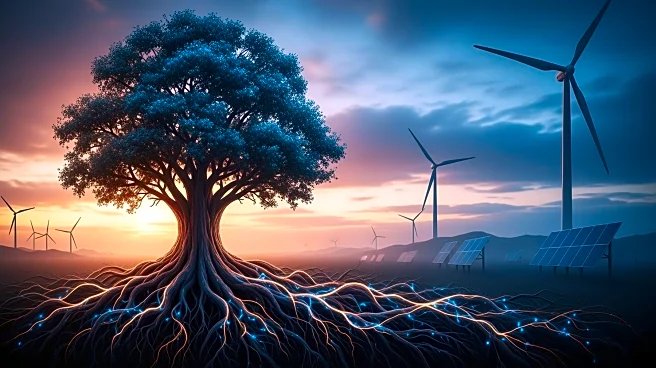What's Happening?
The COP30 Covered podcast has shifted its focus to human-centric themes, including public health, jobs, education, culture, justice, and human rights. The podcast features discussions on the 'Global Ethical
Stocktake,' a new initiative where leaders assess input from various voices, including social, cultural, and spiritual leaders. The episode includes an interview with Woochong Um, CEO of the Global Energy Alliance for People and Planet, who discusses the importance of mobilizing finance for renewable energy in emerging economies. The podcast aims to provide insights into how global climate commitments are being translated into local sustainability actions.
Why It's Important?
The thematic shift at COP30 highlights the interconnectedness of climate action with broader societal issues. By focusing on human-centric themes, the conference emphasizes the need for inclusive approaches that consider the impacts on various communities. The discussions on energy transition are particularly relevant as emerging markets require significant financing to achieve clean energy goals. The podcast serves as a platform to amplify diverse voices and perspectives, fostering a more holistic understanding of climate challenges and solutions. This approach can lead to more comprehensive policies that address both environmental and social dimensions of climate change.
What's Next?
As COP30 progresses, the focus will continue to shift towards systems transformation in energy and industry. The podcast will provide ongoing coverage, offering insights into the developments and discussions at the conference. The 'Global Ethical Stocktake' initiative may lead to new frameworks for assessing climate action, potentially influencing future COP agendas. The emphasis on mobilizing finance for renewable energy in emerging economies could drive international collaboration and investment, accelerating the transition to sustainable energy sources.
Beyond the Headlines
The podcast's focus on indigenous protests and energy transition highlights the ethical and cultural dimensions of climate action. Indigenous communities often bear the brunt of environmental degradation, making their inclusion in climate discussions crucial. The emphasis on justice and human rights underscores the need for equitable solutions that address historical injustices. The podcast's coverage of these themes can contribute to a broader understanding of the complexities involved in climate action, encouraging more inclusive and culturally sensitive approaches.









